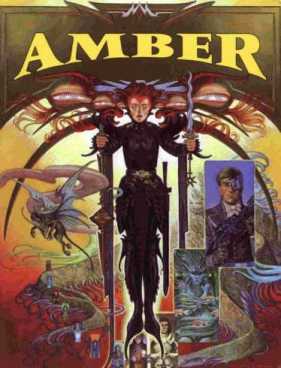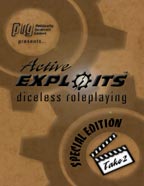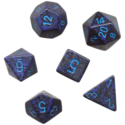
The Amber Diceless Roleplaying Game is a role-playing game created and written by Erick Wujcik, set in the fictional universe created by author Roger Zelazny for his Chronicles of Amber. The game is unusual in that no dice are used in resolving conflicts or player actions; instead a simple diceless system of comparative ability, and narrative description of the action by the players and gamemaster, is used to determine how situations are resolved.
A storytelling game is a game where multiple players collaborate on telling a story. Some games primarily feature spoken storytelling, while others primarily feature collaborative writing. In some storytelling games, such as many tabletop role-playing games, each player represents one or more characters in the developing story. Others involve more third-person narrative.

Active Exploits is a diceless set of role-playing game rules by Precis Intermedia Gaming. The core rules are distributed for free as a PDF file, or for a fee as a printed book. There are a number of published game settings and official game conversions which use these rules.
Jenna Katerin Moran, previously known as Rebecca Sean Borgstrom and in early publications credited as R. Sean Borgstrom, is an American role-playing game (RPG) writer and designer, and novelist.

Nobilis is a contemporary fantasy tabletop role-playing game created by Jenna K. Moran. Early editions were published under Moran's previous names, Rebecca Sean Borgstrom and R. Sean Borgstrom. The player characters are "Sovereign Powers" called the Nobilis; each Noble is the personification of an abstract concept or class of things such as Time, Death, cars, or communication. Unlike most role-playing games, Nobilis does not use dice or other random elements to determine the outcome of characters' actions, but instead uses a point-based system for task resolution.

Character creation is the process of defining a player character in a role-playing game. The result of character creation is a direct characterization that is recorded on a character sheet. This may include a representation of the character's physical, mental, psychological, and social attributes and skills in terms of the specific game's mechanics. It may also include informal descriptions of the character's physical appearance, personality, personal back-story ("background"), and possessions. Games with a fantasy setting may include traits such as race, class, or species. Character creation is the first step taken by the players in preparation for a game.
Blacksburg Tactical Research Center (BTRC) is an American game publishing company best known for the TimeLords, Macho Women with Guns, and EABA role-playing games. They have produced a variety of role-playing games, card games, and board games. Since 2003, they have published exclusively in PDF format.

Precis Intermedia publishes downloadable PDF-based and traditional printed role-playing games. They also publish downloadable paper gaming miniatures called Disposable Heroes, and other various miniatures and tabletop games. Precis Intermedia merged with Spectre Press, one of the first RPG publishers to offer PDF-based products on the internet.

The following is a timeline of tabletop role-playing games. For computer role-playing games see here.

A tabletop role-playing game, also known as a pen-and-paper role-playing game, is a kind of role-playing game (RPG) in which the participants describe their characters' actions through speech and sometimes movements. Participants determine the actions of their characters based on their characterization, and the actions succeed or fail according to a set formal system of rules and guidelines, usually involving randomization. Within the rules, players have the freedom to improvise, and their choices shape the direction and outcome of the game.

Fate of the Norns is a series of Viking fantasy role-playing games first published in 1993 by Pendelhaven. It was created by Andrew Valkauskas. The game uses an experience point system and afterlife mechanics rooted in Norse mythology.
David Vincent Baker is a designer and theorist of tabletop role-playing games and the owner of indie role-playing games publisher Lumpley Games, which also hosts the archives of The Forge. He and his wife Meguey Baker designed Apocalypse World, the first game in the Powered by the Apocalypse system. Apocalypse World won Game of the Year, Best Support, and Most Innovative game at the 2010 Indie RPG Awards, and was 2011 RPG of the Year at both the Golden Geek Awards and Lucca Comics & Games. Baker also designed Dogs in the Vineyard, which won the 2004 Indie RPG Game of the Year and Innovation Award and was one of three games shortlisted for the 2004 Diana Jones Award.
Edward P. Healy is a game designer who has worked primarily on role-playing games. He co-founded Eden Studios.

Actual play, also called live play, is a genre of podcast or web show in which people play tabletop role-playing games (TTRPGs) for an audience. Actual play often encompasses in-character interactions between players, storytelling from the gamemaster, and out-of-character engagements such as dice rolls and discussion of game mechanics. The genre emerged in the early 2000s and became more popular throughout the decade, particularly with the 2015 debut of Critical Role, an actual play webseries featuring professional voice actors.

City of Mist is an urban fantasy neo-noir detective tabletop role-playing game (RPG) designed by Amít Moshe and published by Son of Oak Game Studio. The game is set in a modern-day metropolis where ordinary people of all walks of life become modern-day reincarnations of myths, legends, and fairy tales, gaining magical powers and abilities.
Ten Candles is a horror tragedy tabletop role-playing game by Stephen Dewey. No characters survive the play session. It uses fire as a game mechanic. In the dark, players literally burn character trait cards and use ten tea candles as a countdown timer to the end of the game.
Grant Howitt is a tabletop role-playing game designer, publisher, and journalist. He won six ENNIE Awards for his game Heart: The City Beneath. His game Honey Heist, which inspired an online trend of self-published games with one-page rulesets, has been featured on Critical Role, The Adventure Zone, and Friends at the Table. Through his publishing company Rowan, Rook and Decard, Howitt is a co-designer on Kieron Gillen's DIE: The Roleplaying Game.
Trophy RPG is a psychological horror tabletop role-playing game by Jesse Ross about doomed treasure hunters in the woods. There are two versions of the game: Trophy Dark and Trophy Gold. Trophy Dark is designed for single session play, while Trophy Gold is designed for longer campaigns. Both versions were published by Gauntlet Publishing in 2022 after a successful Kickstarter campaign raised $210,141. Trophy RPG won the silver medal for "Best Game" at the 2023 ENNIE Awards.
Queerz! TTRPG is a tabletop role-playing game about LGBTQ superheroes, inspired by Super Sentai. The heroes use kindness, empathy, self-acceptance, and friendship to battle villains that represent bigotry and ignorance. The mood is campy. The game is based on the manga Queerz! by Isa Isago Fukuda. The game was designed by Amít Moshe based on his City of Mist system, with writing by Steven Pope and illustrations by Isa, who created the manga. Queerz! was published in March 2024 by Son of Oak game studio after raising $104,292 on Kickstarter.
Slayers is a 2020 tabletop role-playing game by Spencer Campbell about monster-hunting in a cursed city. It won an Indie Game Developer Network award and was nominated for three ENNIE Awards.








